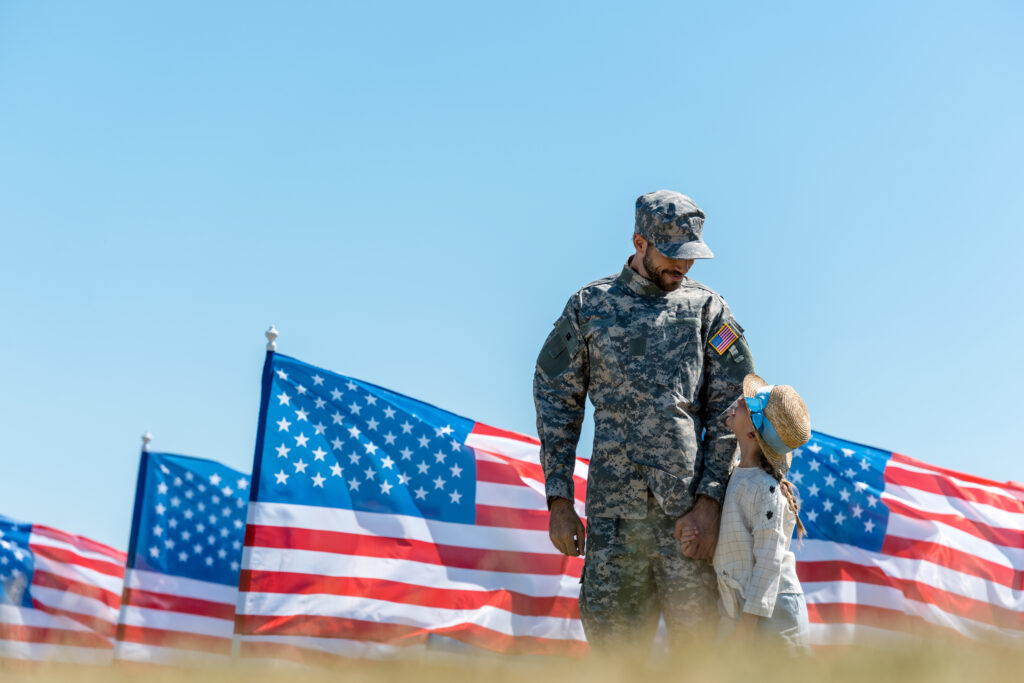In 2023, the Veterans Benefits Administration (VBA) paid out a record $163 billion in earned benefits to 6.3 million veterans and survivors.
Yet, a lot of money was left on the table as tens of billions of dollars available for disability benefits went unclaimed. In fact, it is estimated that up to 40% of veterans who were eligible for benefits did not file claims for the benefits they are entitled to.
This is especially true for Senior veterans and their spouses. Since it may be decades since military separation, many senior veterans do not know or have forgotten the Department of Veterans Affairs (VA) benefits available to them. Not to mention the fact that over time eligibility requirements for many benefits have changed.
There are two primary reasons why Veterans don’t know their benefits: (1) the vast majority of veterans do not utilize the VA Healthcare System, so they have no VA medical professionals or case workers to advise them in the event a disability benefit-qualified illness arises, and (2) many are led to local and on-line clerical services that fill out forms associated with one benefit only. To maximize the benefits your advisor should be VA Accredited and an expert on VA regulations.
The VA Healthcare System
VA Healthcare is the largest healthcare system in the USA. Veterans with a better than dishonorable discharge can enroll. If the veteran is uncertain of enrollment, he or she can confirm at (877) 222-8387. Online enrollment is easy and takes a week or less to process.
Enrollees are given a priority status of 1 to 8. The lower priority numbers receive more services and lower co-pays. The lowest priority numbers are given to service-connected disability-rated veterans followed by low-income veterans. Senior veterans without a service-connected disability rating have seen their income reduced significantly if they’re retired and may want to apply/reapply and get a lower priority number.
Two benefits of enrollment that most seniors are not aware of are: (1) home care aides for those needing assistance with activities of daily living or supervision due to cognitive impairment, and (2) low prescription drug co-pays.

VA Disability System
The VA Disability System is divided into Service-Connected Disabilities and Non-Service Connected Disabilities components. Let us look at the significant developments and requirements in both areas that are relevant to Seniors. First, let us examine Service-Connected Disabilities.
Where to Look for Unclaimed Benefits: Most of us know that a veteran who sustained an injury or an illness in the line of military duty and has a lingering disability can apply for disability income. This is called a Service-Connected Disability and there are no income and assets restrictions.
However, claims based upon Presumptive Illnesses are where a large chunk of unclaimed benefits may be found. Much has changed here, so this is where every veteran should take a closer look. To refresh your memory, a presumptive service-connection is a designation by the Department of Veterans Affairs (VA) that certain conditions or diseases are automatically considered to be related to a veteran’s military service and therefore qualify for Service Connected Disability Compensation.
The burden of proof has been lifted from the veteran and there is no need for direct evidence linking the condition to service.
Many veterans and surviving spouses are missing out on their earned disability benefit income and survivor’s benefit income because they don’t know all of the presumptive illnesses associated with service in the Vietnam, Gulf, and Post 9/11 theatres of war. Any veteran that served in these areas is presumed to have been exposed to toxins: Agent Orange in Vietnam and Burn Pit Toxins in Gulf and Post 9/11 wars.
Many illnesses have been attributed to exposure to these toxins. And many of these illnesses usually do not onset until the senior years… decades after military service. If the veteran of these wars acquires any of the presumptive illnesses, at any time, then the VA presumes that the illness is service-connected. The list of illnesses is extensive and the passage of the PACT Act by Congress in 2022 provides coverage for a significant number of additional illnesses.
Presumptive illnesses linked to Agent Orange exposure include: Hodgkin’s disease, Prostate cancer, Respiratory cancers (including lung cancer), Parkinson’s disease, Bladder cancer, Hypothyroidism, Congestive heart failure, and approximately a dozen other diseases and conditions.
Presumptive illnesses linked to Burn Pit exposure include: Brain cancer, COPD, Emphysema, Respiratory cancers (including lung cancer), Melanoma, Pancreatic cancer and over a dozen other diseases and conditions.
To use an example, this means that a person who served in the Vietnam or Gulf theatres of war and who has been a heavy smoker for years and is diagnosed with lung cancer can receive disability benefits because this is considered to be a presumptive service-connected illness.
The additional illnesses now attributed to presumptive service-connection can also greatly impact the survivor benefit for the spouse of a veteran who died in military service or afterwards as a result of a service-connected injury or illness. This benefit is known as Dependency and Indemnity Compensation (DIC) and is also available for the spouse of a 100% disability rated veteran who was so rated for 10 or more years before death and they were married for those 10 years.
A complete list presumptive service-connected conditions linked to toxic exposure may be found at:
www.publichealth.va.gov/exposures/agentorange/conditions/index.asp for Vietnam War veterans and
www.va.gov/resources/the-pact-act-and-your-va-benefits/ for Gulf War veterans.
Now might be a good time to contact your St. Johns County Veterans Service Office or a VA-accredited advisor to discuss your personal situation.
The other, lesser-known component of the Disability System is Non-Service Connected Disabilities. Known as “the best kept secret” in long-term care these benefits help pay for Home Care Aides, Independent Living, Assisted Living & Memory Care, Adult Day Care, and Nursing Home Residency Care.
The Non-Service Connected Disability Benefits are:
Disability Pension plus Aid & Attendance Allowance : Reserved for veterans who: (1) served on active duty in an era of wartime… combat not required.. with an honorable discharge; (2) served for 90 or more active duty days for other than training purposes; (3) are age 65 or older or receive Social Security Disability Benefits; (4) require assistance with 2 or more activities of daily living or supervision due to cognitive impairment.
Survivor Pension plus Aid & Attendance Allowance: The survivor benefit for spouses of those veterans eligible under the military service requirements in (1) above. The surviving spouse rules: married to the veteran for a year or more preceding death, has not remarried, and requires assistance with 2 or more activities of daily living or supervision due to cognitive impairment.
Non-Service Connected Disability benefits have income and asset requirements that must be met before one is qualified, therefore; it’s best to contact a VA-accredited financial planner or attorney if you need assistance.
VA Caregiver Support Program
Under this program the spouse or other informal caregiver of the veteran can be paid for caregiving at home. It provides resources, education, support, a financial stipend, health insurance (if eligible), and travel (if eligible) to the caregiver of a veteran with a VA-rated 70% or greater disability. Requires care due to the inability to perform an activity of daily living or the need for supervision, protection, or instruction.
Misinformation about VA benefits abounds so be sure to utilize a VA Accredited advisor and don’t assume that what you hear from anyone else is correct, including, often what you hear from those in the VA healthcare system. The regulations for Pension benefits are complicated and change often. For example, many are told that they receive too much income to qualify. That’s just not true for most middle-income claimants on fixed retirement income. VA uses a special formula to calculate income for this benefit. Additionally, not all assets are countable assets under this benefit including most people’s largest asset, their home.
Florida is the senior citizen scam capital and senior veterans that might be eligible for large sums of financial benefits are an attractive target.
For example:
Since the recent passage of the PACT Act (burn pit toxin presumptive illnesses), radio, TV, and the internet have been flush with ads leading veterans to believe that they need an attorney’s help to apply for the benefits. There are reports of attorney contingency fees of up to 40%. Every county in Florida has a Veterans Service Office (VSO) to assist veterans and spouses with filing a service-connected claim for no fee. You do NOT need an attorney. Call the VSO or an Accredited Advisor for a list of what to take with you to the VSO office and make sure to file an “Intent to File” form immediately after deciding to file.
Both the A&A Pension and the Survivor Pension have financial requirements making claimants the target of what VA calls “Pension Poachers”. The GAO recently performed an investigation and turned up over 200 annuity marketing organizations that had formed non-profits with veteran-friendly names to serve as a prospecting tool for financial product salesmen and attorneys.
Veterans Affairs Offices in St. Johns County
St. Johns County Veterans Service Office
Assists veterans with filing claims for disability benefits, pensions, and other VA benefits including formal claims preparation; provides guidance on VA healthcare, education, and other resources.







